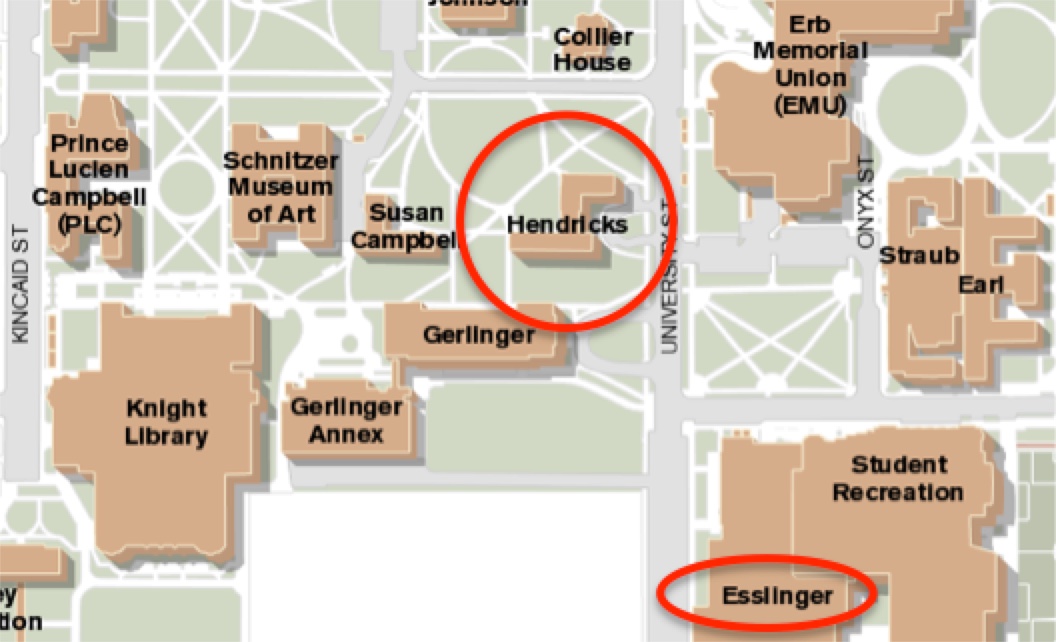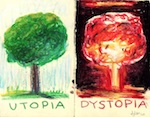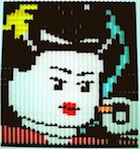|
WGS 352 Download the course policies and syllabus (PDF).
"The future is already here -- it's just not very evenly distributed."
"Beware:
|
JOSE ESTEBAN MUNOZ wrote in the introduction to Cruising Utopia that the "future is queerness’s domain. Queerness is a structuring and educated mode of desiring that allows us to see and feel beyond the quagmire of the present...Queerness is a longing that propels us onward, beyond romances of the negative and toiling in the present. Queerness is that thing that lets us feel that this world is not enough, that indeed something is missing." Our course will engage dystopian (and utopian) literature as political and vernacular theory, as strategies for thinking critically about the past, present, and future in order to imagine what is "missing" from this world, what would this world be like under different conditions and configurations of race, gender, sexuality, ability, and other intersectionalities. In other words, we will explore what it means to look at literature through queer and feminist lenses to address the representations and politics of different identities, embodiments, and desires, particularly as critiques of heteronormativity and other forms of oppression. To that end, we will look at a range of literature that may or may not be overtly about queerness or that may or may not be ostensibly by queer writers or artists including W.E.B. Du Bois, Aldous Huxley, Shirley Jackson, George Orwell, Samuel Delany, Joanna Russ, James Tiptree, Jr., Margaret Atwood, Larissa Lai, and Octavia Butler. A REQUIREMENT for this class is a well-developed curiosity about the world, about the culture we live in, and about the cultural productions we imagine, produce, and consume. In other words, this class is about reading, critiquing, and analyzing our culture through different literatures and texts. We will engage different practices enjoying and analyzing literature and other media, as well as develop feminist and queer strategies, habits, and perspectives of reading, thinking, and writing. Foremost, we will read and research with pleasure and for pleasure. We will also close read for analysis. And lastly, we will read and deploy literature as theory, as dramatizing the concerns, wonders, struggles, and politics of lived life and experience. SPECIFICALLY, our course goals include:
• We will develop and demonstrate a familiarity with a range of texts, terms, and theories of the
study of dystopian (and utopian) literature, with special attention to women writers and authors of color.
WE WILL spend the quarter asking and addressing difficult, challenging,
and sometimes discomforting ideas, questions, and topics, focusing on different identities, bodies, histories,
desires, experiences, and even struggles and violences. Whether on the page, screen, on campus, or in the
community, we will explore and engage multiple perspectives, levels of familiarity with the material, and
heady and heartfelt responses. In other words, our class will be a safe, respectful, but not necessarily
comfortable space. While pushing boundaries and comfort zones are essential to critical thinking, making
connections, and intellectual and personal freedom, see me with concerns and queries, for reasonable
accommodations, and for further resources on campus.
|
"In a time of deceit telling the truth is a revolutionary act."
"You must write, and read, as if your life depended on it."
Required Course Texts & Materials
• WGS 352 Course Reader (available via Campus Copy)
|
|
Course Requirements
Presentation (10%) Download the course policies and syllabus (PDF).
|
Requirements & GradingYour grade should not be the sole exigence or motivation for this class. It is the hope of the course that you walk away from our class with something more. Find some pleasure and some edification and some knowledge from this class (or any class really) and success is usually not far behind. With that in mind, your grade will be a reflection of engagement, effort, close reading, critical thinking, writing, and participation. Critical Essay & Question Presentation (10%) You will be a required to sign up in small groups for an oral presentation during the course of the quarter. For your presentation, you will read the literary text assigned for a particular week, articulate one or two main points from the week’s scholarly text (as assigned), generate a critical question or two connecting the two, and get class discussion started for the day. A short single-spaced half-sheet or 1-page handout copied for the whole class is encouraged. Presentations are no more than 10 minutes, may include media, and each presenter must have a substantive speaking part. In-Class Quizzes (10%) There will be five or more in-class quizzes at various times during the quarter. These quizzes serve as a review of the week’s main ideas, terms, texts, and readings. These quizzes will include identifications, fill-in-the-blanks, definitions, and short answers. Exams (40%) You will have three take-home exam opportunities, which will consist of short answer and essay questions. Exams will be due at the end of Week 4, Week 8, and Week 11. You must complete two of the three exams. Exams will be cumulative and based on the class readings, literature, other media, and in-class and Canvas discussions. Critical Review (10%) You will be required to write a short, 500-600 word, single-spaced critical review of a text not covered by the course that you believe fits the critical, theoretical, and intellectual stakes of this class. You will locate a text, close read the text, and generate an academic critique and assessment of the text's value for study. In other words, what text might you include in a class like ours? You must have your text approved by the instructor. The critical review will be turned in and published on the course blog and is due by the last day of instruction. Participation and Preparedness (30%) Preparedness and participation forms a large component of your final grade. It is essential that you prepare for class and regularly participate online. Moreover, negative participation will hurt your participation grade. Participation is determined by 1) your respectful presence in the class forums and interactions with me, your GE/GTF, and others, 2) your willingness to discuss, comment, and ask questions, 3) your preparation for class, which includes having the required materials on hand and doing all of the assigned reading and watching for class, 4) your engagement in presentations, group work, and events, and 5) your care and daily use of the class Canvas--henceforth called the "class blog"--bookmark the address, check and comment regularly, once or twice a week, and think of the blog as an extension of class: |
"First sentences are doors to worlds."
"So here is why I write what I do: We all have futures. We all have pasts. We all have stories. And we all, every
single one of us, no matter who we are and no matter what's been taken from us or what poison we've internalized
or how hard we've had to work to expel it--we all get to dream."
|
|
|
Attendance
Attendance is required. If you are absent, you miss the explanation of an assignment, the discussion of a reading, the
chance to participate, and overall, the class as a community of learning. Also, you are expected to be in class on time.
Class will start immediately at the appointed time. In the first minutes of class I may make important announcements,
establish the agenda for the day, begin immediately with an important lesson, or field questions. If you come in after
we start class, even by only a few minutes, you are late and will be mark as such. Chronic or conspicuous attendance
problems will negatively affect your overall participation grade for the class. Moreover, absences for more than 9
class sessions (50% of class time or more) will result in a failing grade regardless of reason. There are no excused
or unexcused absences. If you know you are going to or must miss class, please let me know (via email) as soon as
possible and make any necessary arrangements. When you do miss class, always find another student to get class notes
or see me during office hours in order to make up missed work in a timely manner. You are always responsible for all
material covered during your absence.
|
|
|
MLA Paper Formatting 1) 1" margins top, bottom, left, and right on each page. 2) Single-spaced block header on the first page only with your name, date, course, my name:
Student Name 3) Appropriate title. 4) Print single-sided. Papers are double-spaced with paper page numbers in the upper right hand corner; no extra space between paragraphs. 5) Standard Times Roman Font, 12 point only. 6) Correct MLA citation and bibliographic format. A paper turned in without a bibliography automatically fails and will be returned with no comments.
|
Assignment FormatAll papers must be typed or produced on a word processor. All documents should be saved in Microsoft Word format; if you do not have access to Word, then save your documents in PDF or Rich Text Format (RTF). All papers must follow the manuscript format outlined by the assignment. Unless instructed otherwise, all papers must use MLA citation and documentation conventions. All papers must be neatly printed (in black), single-sided, stapled in the top, left-hand corner if necessary, and not be three-hole punched. Papers that do not follow these format guidelines will not be accepted. They will be returned unread to you. Papers will be regarded as late until they are resubmitted in the proper format. Response Papers and the Critical Review have different manuscript guidelines detailed by their assignment prompts. Always make a backup copy of every paper you turn in, lest you be one of the unhappy people whose paper is eaten by the computer. You may even want to take the precaution of e-mailing your paper to yourself as an attachment at least a couple of times during the drafting process and certainly BEFORE you exit the document for the last time and leave the computer. This way, even if you lose your flash drive or your paper gets mysteriously erased, you still have a copy in your e-mail files.
Evaluation RubricOver the course of the semester, your assignments will receive feedback and comments that will identify what you are doing well and what still needs improvement. Your grades assess your fulfillment of the assignment, the quality of work, detail, analysis, and argumentation, overall effort, and finally, style, polish, and risk taking. Consider the following evaluation rubric as signposts or a kind of legend to your progress and evaluation:
• Outstanding (A/A+): Offers a very highly proficient, even memorable demonstration
of the trait(s) associated with the course or assignment goal(s), including some
appropriate risk-taking and/or creativity. |
Late Assignments All assignments must be done completely and turned in on time. Late assignments will be penalized a letter grade for every day that they are late. So, if your essay is late by one day and you received a B- for your work, then your final grade would be a C-. Moreover, I will not comment on late work. However, you still need to complete late work or you will receive a zero. If you miss the due date of a paper, you must notify me and make arrangements to get the paper to me as soon as possible. Unless previously arranged, I DO NOT accept assignments via email. Remember that a paper has not been officially handed in until it is in my hands. Never turning anything in late is always the best policy. |
|
Contact Ed
Office:
Contact Nagore
Office:
Download the course policies and syllabus.
|
Finding HelpMy office and office hours are listed in the left sidebar, as well as the Graduate Teaching Fellow’s information. We are available during the listed time and by appointment to help you. I encourage you to come see me or the GTF early in the quarter even if it is just to talk about the class, about the assignments, or about school in general. I may ask you to meet with me when I think a conference would be useful. My office is located on the third floor of Hendricks Hall (southeast of the EMU), Room 322; your GTF’s office is in Esslinger Hall. See http://map.uoregon.edu/.

I am also available electronically by email and the course blog. Email and the blog are the best means of contacting me. I will do my best to answer your emails and blog posts, usually within twenty-four hours. If there is an emergency and you need to reach me, please contact the main English office in Sitterly 108. Furthermore, when time permits, I will supplement my office hours with virtual hours via AOL Instant Messenger or Google Talk (nickname: EDagogy); if I am logged in, during reasonable hours, you are more than welcome to discuss the class or ask questions. Please, when you initiate an IM conversation for the first time, please identify yourself to me; also, be patient because my responses may not be immediate. You can find additional writing and academic help at the Teaching and Learning Center on campus, a good resource for this class and other classes. The TLC is located in 68 Prince Lucien Campbell (PLC) Hall and offers a variety of services including help with reading, papers, brainstorming ideas, and research. See http://tlc.uoregon.edu/ to make an appointment and for more information.
Further resources, both on- and off-campus can be found on the Links page of the course website:
http://www.edmondchang.com/courses/352/links.html.
|
Learning (With) TechnologyUnless you have an official accommodation, the use of technology in our classroom is a privilege, not a right. Mobile devices like phones, media players, and cameras should be off and put away. Computers and tablets should be used for note-taking, in-class work, and readings only. Print is generally preferred for course texts and readings, but full-size e-versions are acceptable provided the student is able to readily highlight, annotate, and index. Finally, be conscientious and respectful in the use of the course website and social media and post no material from class to the internet or non-class sites without explicit permission from the instructor and the class. Keep in mind these three rules: 1) Use the Right Tool for the situation and the task--keep it simple and elegant, 2) Practice Best Practices--it must improve or enhance your learning, 3) Be a Good Neighbor--it cannot distract or detract from others' learning. Inappropriate use and abuse of technology in class will result in the taking away of technology privileges for the offending student and/or class as a whole.
|
|
|
Academic DishonestyAll students are required to uphold the highest academic standards. Plagiarism, or academic dishonesty, is presenting someone else's ideas or writing as your own. In your writing for this class, you are encouraged to refer to other people's thoughts and writing--as long as you cite them. Many students do not have a clear understanding of what constitutes plagiarism, so feel free to ask questions at any time. For our class, plagiarism includes:
• a student failing to cite sources of ideas If you have any doubt about how to cite or acknowledge another's writing, please talk to me. Any plagiarism or academic dishonesty will result in failure of this course. It is always better to be safe than sorry. Please review the University of Oregon's Guidelines for Plagiarism at http://libweb.uoregon.edu/guides/plagiarism/students/.
AccommodationsPlease let me know in the first week of class if you require academic accommodations based on a disability registered with Accessible Education Services. The University of Oregon is an inclusive learning environment. For more information, contact the Accessible Education Center (formerly Disability Services) in 164 Oregon Hall at 541-346-1155 or http://aec.uoregon.edu/.
Harassment, Discrimination, and Sexual Misconduct
The University of Oregon is committed to ensuring that all students have access to a quality learning experience
and the opportunity to pursue their academic goals in a safe, supportive, and inclusive learning environment. Any
form of sexual harassment, sexual assault, relationship violence, and gender-based stalking and bullying is contrary
to the community values of the institution. Title IX makes it clear that violence and harassment based on sex and
gender is a Civil Rights offense subject to the same kinds of accountability and the same kinds of support applied
to offenses against other protected categories such as race, national origin, and so on. As your instructor, I have
a mandatory reporting responsibility and am required by law to share with the University any information regarding
sexual misconduct or information about a crime that may have occurred on campus. For more information about policies
and resources or confidential reporting options, see the Office of Affirmative Action & Equal Opportunity:
http://aaeo.uoregon.edu/sexual-harassment-assault
or the Dean of Students' page on Student Conduct & Community Standards:
https://uodos.uoregon.edu/StudentConductandCommunityStandards.aspx.
|
"Some of my favorite places I have been in my life exist only in dreams."
"If you think a thing is impossible, you'll only make it impossible."
"To me, the American Dream is being able to follow your own personal calling. To be able to do what you want
to do is incredible freedom."
|
|
|
© 2016-17 Edmond Chang. All original material. All rights reserved. Contact the webmaster of this site. These pages are best viewed with Mozilla Firefox or Internet Explorer. Open your browser to the largest viewable area. These pages are hosted by ED(MOND)CHANG(ED)AGOGY, the academic, professional, and creative website of Edmond Y. Chang. |
|


















